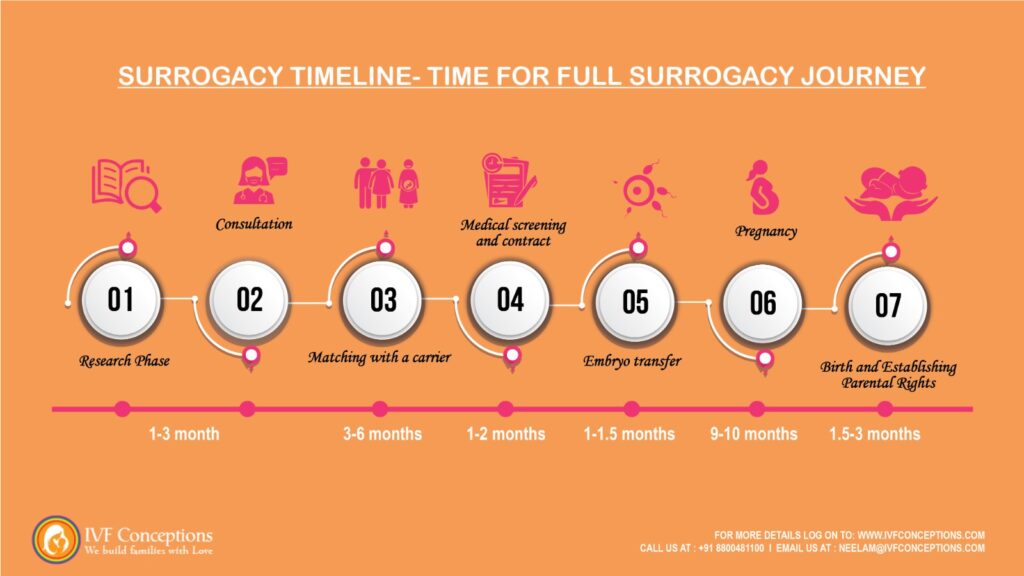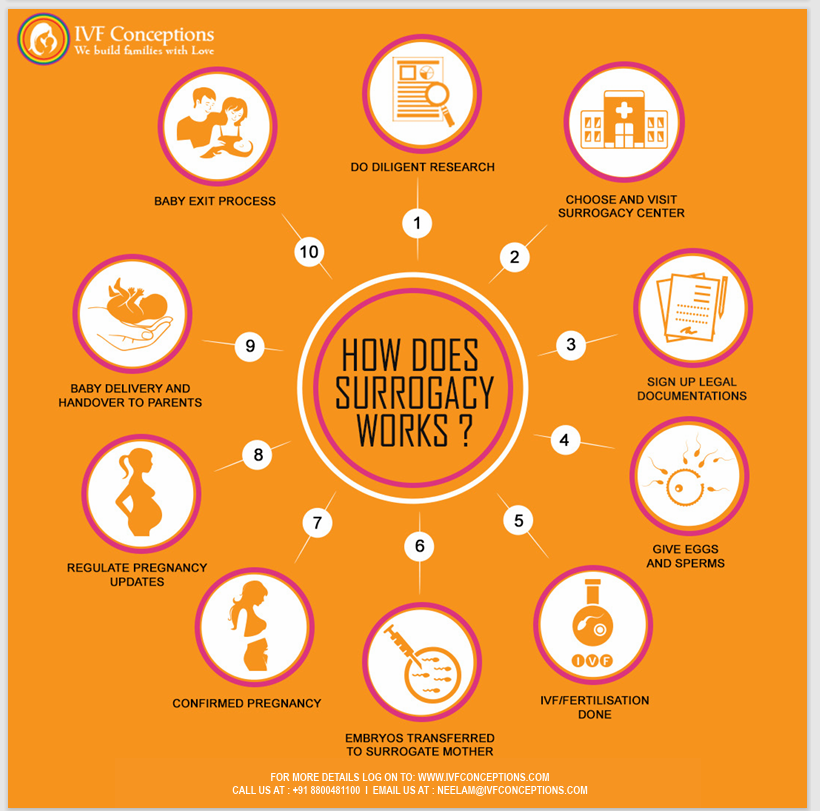The Surrogacy Process: A Step-by-Step Guide to Building Families. Find out how the surrogacy process works. A guide for both surrogate and intended parents for a successful surrogacy journey

How Does the Surrogacy Process Work?
Surrogacy is a reproductive arrangement that has gained significant attention and recognition in recent years. It is a process in which a woman, known as the surrogate mother (or gestational carrier), carries and gives birth to a child on behalf of childless couples, known as the intended parents.
- Book an online appointment: Get a free online consultation.
- Call\W:+91-8800481100 Email:neelam@ivfconceptions.com
The purpose of surrogacy varies from one situation to another, but it often serves as a means for individuals or couples who are unable to conceive or carry a pregnancy to fulfill their dreams of having a child. In this article, we will cover the surrogacy process with a step-by-step guide.
Additional resources to Read:
Surrogacy with 2 Surrogate Mothers
What is Gestational Surrogacy- Comprehensive Guide
How To Choose Between IVF and IUI: A Comprehensive Guide
Key Takeaways:
- The surrogacy process helps in family building for those who wish to grow their families but are unable to do it due to medical or personal reasons. It gives you real hope and many times a real chance to have a child of your own.
- Many times, the gestational surrogacy process is the last option for intended parents to have the baby after years of infertility struggles.
- The process of surrogacy involves many different people intended parents, surrogate mothers, egg donors, surrogacy agency coordinators, reproductive lawyers, and IVF specialists.
- Assisted reproduction technique (ART) and third-party reproduction play an important role in making any surrogacy process successful.
- The surrogacy process offers the opportunity to build families, create lifelong bonds, and fulfill the dreams of intended parents. It requires professional guidance, legal support, and emotional understanding.
 Understanding Gestational Surrogacy Process
Understanding Gestational Surrogacy Process
The concept of surrogacy is not new and has been practiced in various forms throughout history. However, advancements in assisted reproductive technologies have expanded the possibilities and options available to infertile couples, single males, and gay couples seeking to build their families through surrogacy.
Begin the surrogacy process when you are emotionally and financially ready for it and choose surrogacy when you do not have any other options left. The process of surrogacy is long, complicated, and emotionally and financially draining, so choose wisely as surrogacy typically is more demanding than it seems initially.
There are 2 types of surrogacy: traditional surrogacy and gestational surrogacy.
In traditional surrogacy, the surrogate mother is genetically related to the child she carries, as her own egg is fertilized with the intended father’s sperm or donor sperm.
On the other hand, gestational surrogacy involves the use of in vitro fertilization (IVF), where an embryo created using the intended parents’ or donors’ genetic material is transferred to the surrogate’s uterus. In this case, the surrogate mother is not biologically related to the child she carries. Gestational surrogacy work is long and more costly.
If you are considering surrogacy it is deeply personal and can be influenced by various factors, including medical conditions, infertility challenges, unable to become pregnant, same-sex partnerships, or other circumstances. It is a complex process that involves emotional, legal, and medical considerations for all parties involved.
That is why, we insist you consider if surrogacy is the right choice for you. If yes, then do as much research as possible to know what is the surrogacy process and make an informed decision.
How long does surrogacy take?
Here is the surrogacy timeline for a typical surrogacy journey for intended parents:
Stage | Description of Stage | Duration |
Research Phase | Explore family-building options and decide on surrogacy. | Personal timeframe |
Consultation and Application | Choose a surrogacy agency, sign agreement, and start embryo creation (if needed). | 1-3 Months |
Matching | Agency finds and presents potential gestational carriers. Meet and decide on a match. | 3-6 Months |
Medical Screening and Contracts | Carrier undergoes medical and psychological screening. Sign surrogacy contract. | 1-2 Months |
Embryo Transfer | Prepare for embryo transfer. Success may take multiple attempts. | 1-1.5 Months |
Pregnancy | Gestational carrier’s pregnancy, approximately 40 weeks. | 9-10 Months |
Birth and Postpartum | Baby’s birth, establish parental rights, and postpartum period. | 1.5-3 Months |
Please keep in mind that the durations mentioned in the table are approximate and can vary depending on individual circumstances and other factors. Always consult with a reputable surrogacy agency or professional to get personalized guidance throughout the surrogacy journey.
- Book an online appointment: Get a free online consultation.
- Call\W:+91-8800481100 Email:neelam@ivfconceptions.com
The Surrogacy Process- A Step-by-step Guide for the intended parent
Here is a surrogacy process step-by-step guide for both intended parents and surrogate mothers. Let’s learn how to start the surrogacy process while keeping the end goal in mind.
#1. Initial Consultation and Screening
What is the process of surrogacy? The surrogacy process involves several important steps, starting with an initial consultation and screening. These steps are crucial for both intended parents and potential surrogates to ensure a successful and well-matched surrogacy journey. Let’s take a closer look at these steps of the surrogacy process:
- Initial Consultation: Surrogacy process for intended parents:
Intended parents and potential surrogates meet with a surrogacy agency or fertility clinic to discuss their goals, expectations, and the overall surrogacy process.
During this consultation, both parties have the opportunity to ask questions, clarify doubts, and understand the agency’s or clinic’s role in facilitating the surrogacy journey.
- Screening Procedures:
Medical Evaluations: Intended parents and potential surrogates undergo comprehensive medical evaluations to assess their overall health and reproductive capabilities.
Intended parents may be required to provide medical history, undergo fertility testing, and complete any necessary medical procedures to determine their suitability for surrogacy.
Additional Resources to Read:
Choosing Between International and Domestic Surrogacy
How To Choose Between IVF and IUI: A Comprehensive Guide
Who are Surrogate Mothers: Become A Surrogate Mother
What are Surrogate Mother Requirements
Potential surrogates undergo thorough medical examinations, including physical examinations, hormonal assessments, and reproductive health screenings, to ensure their ability to carry out a healthy pregnancy.
- Psychological Assessments:
Both intended parents and potential surrogates undergo psychological assessments conducted by licensed professionals.
These assessments aim to evaluate the mental and emotional readiness of all parties involved in the surrogacy process.
Intended parents may explore their motivations, expectations, and preparedness for the emotional challenges that may arise during the surrogacy journey.
Potential surrogates undergo evaluations to assess their psychological well-being, understanding of the surrogacy process, and ability to establish healthy boundaries.
- Legal Considerations:
Intended parents and potential surrogates may need to consult with legal professionals to review and draft surrogacy agreements.
Surrogates and intended parents can have their own independent legal opinion with surrogate lawyers.
These agreements outline the rights, responsibilities, and expectations of all parties involved, ensuring a legally binding and well-defined surrogacy arrangement.
Legal professionals guide surrogacy laws, parental rights, and other legal considerations that vary based on jurisdiction.
The initial consultation and screening processes play a vital role in the surrogacy journey. They help establish a strong foundation for trust, compatibility, and understanding between intended parents and surrogates. Through thorough medical evaluations, psychological assessments, and legal consultations, the surrogacy process can proceed with confidence, ensuring the well-being and success of all involved parties.
Step | Description | Duration/Timeframe |
Research Surrogacy | Learn about surrogacy and its benefits. | Varies based on individual readiness and research. |
Plan for a Surrogacy Journey | Understand your starting point, set expectations, and create a custom roadmap. | Varies based on individual preparation. |
Match With A Surrogate | Retain ConceiveAbilities to recruit and match you with a surrogate. | Varies based on surrogate availability. |
Begin Pregnancy | Surrogate undergoes medical clearance and embryo transfer takes place. | Time needed for medical procedures. |
Prepare for Your Baby’s Arrival | Surrogate’s obstetrician takes over medical care, and a birth plan is created. | During the middle of surrogate’s pregnancy. |
Conclude Your Surrogacy Journey | Support for the surrogate post-pregnancy, settling financial matters, and considering future journeys. | Post-pregnancy period and individual decisions. |
#2. Matching Process and Legal Procedures for Surrogate Mother
The surrogacy journey involves a matching process between intended parents and a compatible surrogate, followed by important legal procedures and the establishment of comprehensive surrogacy agreements and contracts. Let’s explore these aspects in more detail:
- Matching Process of Surrogacy:
Once intended parents and potential surrogates have completed the initial consultation and screening, the matching process begins.
Surrogacy agencies or IVF clinics play a crucial role in facilitating the matching process, using various criteria to find the most suitable match for both parties.
Factors considered during the matching process may include medical compatibility, personal preferences, shared values, and legal considerations.
- Importance of Legal Procedures:
Legal procedures are essential in protecting the rights and responsibilities of all parties involved in the surrogacy arrangement.
Legal professionals specializing in reproductive law guide intended parents and surrogates through the legal aspects of surrogacy, ensuring compliance with local laws and regulations.
These legal procedures establish a clear framework for the surrogacy journey, addressing important aspects such as parental rights, financial agreements, and the surrogate’s obligations.
- Comprehensive Surrogacy Agreements and Contracts:
Surrogacy agreements and contracts are legally binding documents that outline the rights, responsibilities, and expectations of all parties.
These agreements typically cover aspects such as compensation, medical expenses, confidentiality, decision-making processes, and the surrogate’s role during pregnancy.
Intended parents, surrogates, and their respective legal representatives collaborate to draft comprehensive agreements that protect everyone involved. It is normal to have both intended parents and surrogate mother have their own legal representation to protect their rights.
- Involvement of Legal Professionals:
Legal professionals specializing in reproductive law play a crucial role in ensuring the legality and enforceability of surrogacy arrangements.
They provide guidance, review, and assist in the negotiation of surrogacy agreements, ensuring that all parties fully understand their rights and obligations.
Legal professionals also navigate complex legal frameworks, including parentage orders, birth certificates, and the transfer of parental rights after the child’s birth.
The matching process, along with the implementation of legal procedures and comprehensive surrogacy agreements, establishes a solid foundation for a successful and legally protected surrogacy journey. By working closely with legal professionals, intended parents and surrogates can navigate the complexities of surrogacy law, ensuring the rights and well-being of all parties involved.
#3. Fertility Treatments and IVF and embryo transfer
Fertility treatments, particularly the use of assisted reproductive technologies like in vitro fertilization (IVF), play a crucial role in the process of surrogacy.
According to the latest data from the Society for Assisted Reproductive Technology (SART), the average cost per IVF cycle in the United States ranges between $12,000-$17,000 on average. This comprises procedures like egg retrieval, lab work, genetic testing, embryo culture and storage, embryo transfer, and more. However, many factors influence overall IVF pricing from clinic to clinic including their technology investments, staffing, and efficiency. How much be cost of fertility treatments will vary depending on what fertility services you choose and your location.
- Overview of the Fertility Treatment Process:
The fertility treatment process aims to enhance the chances of successful conception and pregnancy.
Assisted reproductive technologies, such as IVF, are often utilized in surrogacy to facilitate the creation of embryos and increase the chances of pregnancy.
These treatments involve medical interventions and procedures to overcome fertility challenges and optimize the reproductive process.
If a female parent is using her own eggs, she is the one who goes go through pre-IVF screening and then the stimulation process. If you are using an egg donor, then the egg donor needs to undergo medical screening, psychological evaluation, and necessary legal agreement before starting the medical procedure. In any way, it is a must for each person involved to do necessary medical screening – Intended Father, Intended Mother ( If using her own eggs), Egg Donor ( If needed), and Surrogate Mother. Your surrogacy agency and medical doctor can assist you with pre-IVF test screening.
- Steps Involved in the IVF Process:
The IVF process typically involves several key steps:
- a) Ovarian Stimulation: The intended mother or egg donor undergoes hormonal medications to stimulate the ovaries, promoting the production of multiple eggs.
- b) Egg Retrieval: Once the eggs reach maturity, a minor surgical procedure is performed to retrieve them from the ovaries.
- c) Fertilization: In the laboratory, the retrieved eggs are fertilized with the intended father’s sperm or donor sperm to create embryos.
- d) Embryo Transfer: The resulting embryos are transferred to the surrogate’s uterus, to achieve a successful pregnancy.
- Significance of Synchronization:
Synchronization between the surrogate’s menstrual cycle and the intended mother or egg donor is crucial for the success of the IVF process.
Timing is essential to ensure that the surrogate’s uterus is receptive to receiving the transferred embryos.
Medications and hormonal treatments may be administered to regulate and synchronize the menstrual cycles of the surrogate and the egg donor or intended mother.
Fertility treatments, particularly IVF, offer a scientific and precise approach to surrogacy by optimizing the chances of successful embryo implantation and pregnancy.
Through ovarian stimulation, egg retrieval, fertilization, and embryo transfer, the IVF process enables the creation of embryos that will develop into healthy pregnancies.
By closely following the steps of the IVF process and considering the importance of synchronization, intended parents and surrogates can increase their chances of a successful surrogacy journey.
It is important to note this is a gestational surrogacy process. If you are using traditional surrogacy (though not commonly used), you can opt for artificial insemination of sperm and needed IVF procedures.
#4. Pregnancy and Prenatal Care for gestational carrier
The surrogate plays a crucial role in the surrogacy journey, carrying the intended parents’ child with care and dedication. Regular prenatal care is of utmost importance to ensure the health and well-being of both the surrogate and the growing baby.
Throughout the pregnancy, the surrogate receives comprehensive medical monitoring and regular check-ups. These appointments allow healthcare professionals to closely monitor the surrogate’s health, track the development of the baby, and address any potential concerns or complications that may arise.
In addition to medical care, emotional and psychological support are provided to the surrogate. Open communication channels are established between the intended parents and the surrogate, fostering a positive relationship built on trust and understanding. This communication allows all parties to share their hopes, concerns, and expectations, creating a supportive environment for the surrogate throughout the pregnancy.
Prenatal care encompasses various aspects, including nutritional guidance, exercise recommendations, and emotional well-being. The surrogate is guided by healthcare professionals to maintain a healthy lifestyle and make choices that promote the well-being of the baby. Regular check-ups, ultrasounds, and other medical tests are conducted to ensure that the pregnancy progresses smoothly and that the surrogate and baby remain healthy.
The intended parents are encouraged to actively participate in the pregnancy journey, attending medical appointments and sharing in the joy of milestones such as hearing the baby’s heartbeat or seeing ultrasound images. This involvement strengthens the bond between the intended parents and the surrogate, creating a sense of shared responsibility and mutual support.
Overall, pregnancy and prenatal care in the surrogacy process involve comprehensive medical support, emotional well-being, and open communication. It is a collaborative effort that prioritizes the health of the surrogate and the development of a healthy baby, while also nurturing the relationship between the intended parents and the surrogate.
#5. Childbirth and Post-Birth Procedures for a gestational surrogate
The birth of the child marks the final stage of the surrogacy process, and it is a moment filled with immense joy and anticipation for all parties involved. The presence of the intended parents during childbirth is highly encouraged, as it allows them to witness the arrival of their long-awaited baby and provide emotional support to the surrogate.
The intended parents’ presence during childbirth can help create a supportive and reassuring environment for the surrogate. Their presence serves as a source of comfort, reassurance, and gratitude, acknowledging the incredible journey the surrogate has embarked upon to help them fulfill their dreams of parenthood. The emotional support provided by the intended parents during this significant moment strengthens the bond between all parties involved.
Following childbirth, there are important legal procedures that need to be undertaken to establish the intended parents’ legal parental rights. This typically involves legal documentation and court processes to ensure that the intended parents are recognized as the legal parents of the child. It is crucial to adhere to these procedures to safeguard the rights and responsibilities of all parties involved and to provide legal protection for the intended parents and the child.
Throughout the post-birth period, it is common for the intended parents and the surrogate to maintain contact and continue to build on the relationship that has developed during the surrogacy journey. They may choose to share updates on the child’s growth and development, exchange photos, or even arrange for occasional visits. The level of involvement and ongoing relationship between the surrogate and the intended parents may vary based on individual preferences and agreements.
It is essential to approach the post-birth period with sensitivity, respect, and gratitude. Recognizing and appreciating the surrogate’s selfless act and the significant role she played in bringing the child into the world is vital. Continued communication, gratitude, and support help foster positive relationships and create a supportive environment for all parties involved in the surrogacy journey.
It is a time of celebration, gratitude, and ongoing communication, strengthening the bond between the surrogate and the intended parents as they embark on their shared journey of parenthood. Enjoy each milestone throughout your surrogacy journey.
Conclusion
In conclusion, the surrogacy process is a complex journey that involves multiple parties and legal considerations. It offers hope for couples who are unable to conceive naturally and provides them with an opportunity to experience parenthood. How does surrogacy work and what is the surrogacy timeline, depends on what country/location and what services you need. we work with top surrogacy agencies worldwide and are available for free initial consultation.
Learning more about gestational surrogacy helps to make your alternative parenthood journey less overwhelming.
If you are considering becoming a surrogate, make sure to thoroughly research and consult with a reputable agency to ensure the best experience possible. Thank you for reading this ultimate guide to becoming a surrogate mother, and I wish you all the best on your surrogacy journey.
If you’d like to learn more about IVF, Egg Donation, or surrogacy services globally, check out the rest of our website at Complete Surrogacy Agency. We offer legally secure and affordable surrogacy consulting services for FREE.
For more resources on IVF and Surrogacy, browse our other web page- IVF Conceptions.
For more resources on IVF and Surrogacy, browse our other web page- Georgia Surrogacy Agency.
Our team has over 13 years of experience facilitating surrogacy arrangements, egg donation, and serving as an advocacy resource for infertile couples and LGBTQ individuals seeking to build families.
Our founder and chief surrogacy consultant, Neelam Chhagani, passionately helps couples struggling with fertility challenges. Since starting our surrogacy consulting agency in 2013, we’ve helped welcome over 500 babies for intended parents nationwide.
Our team includes experts from diverse backgrounds with leading reproductive attorneys, professionally trained top fertility doctors, former surrogacy case managers, experienced and kind surrogate mother and egg donor coordinators, mental health professionals specializing in infertility counseling, and a logistic support team to assist you in your chosen surrogacy country.
References used:
Frequently Asked Questions
What is the surrogacy process?
Surrogacy is a process where a woman, known as a surrogate, carries a pregnancy and gives birth to a child on behalf of intended parents who are unable to conceive or carry a pregnancy themselves. The surrogate becomes the gestational carrier and does not have a genetic connection to the child in most cases.
How does the surrogacy process work?
Surrogacy involves several steps, including initial consultations and screenings, matching intended parents with a surrogate, legal procedures and contracts, fertility treatments such as IVF, pregnancy and prenatal care, childbirth, and post-birth procedures. Each step is carefully managed to ensure the well-being and legal protection of all parties involved. A gestational carrier doesn’t provide her genetic material ( eggs) and the intended mother/egg donor is the biological mother.
Who can benefit from surrogacy?
Surrogacy gives real chances of becoming parents to infertile couples who are unable to have babies due to medical reasons, single males, gay couples, women with multiple failed IVF treatments, and intended mothers without a uterus. The gestational surrogacy process provides an opportunity to have a biological child and build a family.
How do I find a surrogate?
You can find surrogate mothers with the help of surrogacy agencies, fertility clinics, or by personal connections. Working with a reputable agency or IVF clinic can help facilitate the matching process and ensure the necessary screenings and legal procedures are followed. Saying this, it is possible to find a surrogate without an agency via online help or with family and friends.
What are the legal aspects of surrogacy?
The legal aspects of surrogacy vary by country and jurisdiction. That is why you need to consider in which country you will do surrogacy and what are surrogacy legislation in your home country. The USA and some Eastern European countries allow the legal commercial surrogacy process. Some countries like Canada, UK, and Australia allows only altruistic surrogacy. For your personal case, get in touch.
How long does the surrogacy process take?
On average, the process can take anywhere from 15 months to 24 months. However, the intended parents should know that the actual duration of the surrogacy process can vary depending on several factors, including the availability of surrogates, legal requirements, and the success of fertility treatments.
What are the costs of surrogacy?
Typical surrogacy cost in the USA is in the range of $150,00 to $180,000. Overseas surrogacy cost is almost half of US cost and most international surrogacy countries have surrogacy packages in the range of $50,000 to $70,000.
What support is available for surrogates?
Surrogates receive comprehensive medical care, including regular check-ups and prenatal care, to ensure a healthy pregnancy. Additionally, emotional support is crucial, and reputable surrogacy agencies often provide counseling services or support groups for surrogates.
Is surrogacy legally recognized?
The legal recognition of surrogacy varies across different jurisdictions. Some countries or states have specific laws and regulations governing surrogacy, while others may have restrictions or prohibitions. It is crucial to understand the legal landscape and seek appropriate legal counsel to ensure compliance with the relevant laws.
Please note that the information provided here is for general guidance, and it is recommended to consult with surrogacy professionals and legal experts to obtain personalized advice based on your specific circumstances and location.
Table of Contents
Contact Us For A Free Surrogacy Consultation!
Hey, I’m Neelam. I’m determined to make a business grow. My only question is, will it be yours?

About Neelam
Neelam Chhagani, MA (Counselling Psychology), PGD (Mental Health), and Holistic Infertility and Third-Party Reproduction Consultant.
Member of European Fertility Society, Best Surrogacy Blogger of 2020, with 200 dedicated blogs and top contributor on Quora for Surrogacy.
Highly esteemed, authoritative, and trusted professional with a 14-year experience in international surrogacy. Advocate for Secure, Legal, and Affordable International Surrogacy.
Follow Us
Our Guarantee

Safe International Surrogacy
Global surrogacy options with best countries for surrogacy that are secure and affordable
Our Services Include:
- Personalized support and communication throughout the entire journey
- Access to affordable and high-quality ART medical facilities and treatments
- Global surrogacy options with best countries for surrogacy that are secure and affordable
- Same-sex surrogacy options – Best countries for gays surrogacy/LGBT Surrogacy
- Single parent surrogacy offered with low-cost surrogate mothers
- Guaranteed Surrogacy Baby Plan with cheapest surrogacy costs
- Legal support and guidance to ensure a smooth and secure surrogacy process
- Complete surrogacy guide so that Intended Parent makes informed choices
- Assistance in cryo-shipments
- Legal assistance from experienced reproductive attorneys
- Discovery consultations and case management
Frequently Asked Questions
Surrogacy laws and regulations vary significantly across countries and even within different states or regions. It is crucial to understand and comply with the legal framework governing surrogacy in the intended jurisdiction to ensure a smooth and legally protected surrogacy journey.
The duration of the surrogacy process typically ranges from one to two years, encompassing various factors that contribute to its timeline. These factors include the waiting period for egg donor, surrogate mother, the time required for the surrogate to conceive or number of IVF attempts, and other relevant variables.
The costs associated with surrogacy can vary widely depending on various variable and unpredictable factors such as the location, the chosen surrogacy agency, medical expenses, legal fees, and compensation for the surrogate.
That being said, intended parents can expect to pay somewhere $130,000 to $150,000 if you are looking for surrogacy in US. In case you are planning to do international surrogacy, the surrogacy price is between $50,000 to $70,000 depending upon the country and types of services taken.
Surrogacy has become an important option for LGBT+ couples who desire to have children biologically related to them. It provides an avenue for same-sex male couples or single men to become fathers and for same-sex female couples or single women to become mothers. Surrogacy has played a significant role in expanding the possibilities of family-building for the LGBT+ community. We recommend and assist you with surrogacy for gay couple in Mexico, Colombia, and Argentina. Similarly, for single parents surrogacy, above options are available.
Surrogacy success rates can vary depending on various factors, including the age and health of the intended parents, the quality of the embryos, and the experience and health of the surrogate. According to recent studies, the success rates of surrogacy can range from 40% to 70% per embryo transfer.
Surrogacy laws and regulations differ significantly from country to country. Some countries have embraced surrogacy and established clear legal frameworks, while others have banned or restricted the practice. It’s essential for intended parents to understand the legal landscape of surrogacy in their desired location and consider factors such as availability, cost, and legal protections. We will advise to consult a experienced surrogacy professional become engaging surrogacy abroad.
No, surrogacy laws vary from country to country. Some countries have banned or heavily restricted surrogacy, while others have well-defined legal frameworks. Countries like USA, Georgia and Ukraine allow commercial surrogacy. However, other countries like Canada, Australia and UK allow only altruistic surrogacy arrangements. Beside this most of the European countries do not recognise any form of surrogacy like Germany, France, Belgium, Sweden etc. Latin American countries like Colombia and Argentina only allowed affordable altruistic surrogacy.
The primary reason for preference for international surrogacy is the prohibition or restriction of surrogacy, or the allowance of only altruistic surrogacy, in the intended parents’ home countries.
In altruistic surrogacy, which involves finding a surrogate without any financial compensation, often presents challenges in terms of finding a suitable surrogate.
However, opting for international surrogacy not only reduce the overall average surrogacy cost but give opportunity to find a surrogate quickly and options to choose from many candidates.
Why Our Intended Parents Choose Us- Testimonials

Neelam is empathic and an awesome professional. She’s always available and eager to response to clients calls. She followed our process the way. Definitely recommend.
J&C (UK)
This whole journey has been absolutely wonderful. And I have such a beautiful daughter today. I have such an amazing army of family and friends surrounding me. She’s brought so much joy to everyone Especially me. I’m grateful that we moved forward I don’t know what I would do without her. So please let Mark now we made the right decision and yes I’m thinking about a second journey. I think it’s important to raise a child with a sibling. So two children seems like the right thing. Will make a final decision in the next 3 to 4 months.
S (USA)
Thank you so much for your handholding and for connecting me with everything. I am so grateful for the role that you’ve played. I’m the happiest father alive. Thank you so much for your guidance along the way. She’s adorable and I’m all gushy in love!!!
SE (USA)
Hoping to have wonder babies, we initiated the process with Neelam at IVF Conceptions. Her warm concerns and dedicated helps drive this process moving through frustrated change of surrogacy policy in India. Finally, the surrogacy was smoothly transferred to Russia and now, we saw our baby growing already. We greatly thank Neelam, who sincerely helped us to achieve our baby dream. There is no doubt that both IVF conceptions and IVF Sunrise provided excellent surrogacy service with transparent fund transactions.
PH (USA)
We are so glad to inform about arrival of twins for our single Intended Parent.. This was his first attempt with Asian egg donor and he was successful in first round of embryos transfer with twins. The pregnancy term was eventless and during routine visit on 34 weeks- doctor decided to CS as surrogate was 4 cm dilated. Babies are so cute and adorable and surrogate- doing well. It goes without saying J L is very delighted and busy dad!!!
JL SingaporeContact us!
We offer surrogacy programs in countries where it is legal, affordable, and safe for international intended parents.


 Understanding Gestational Surrogacy Process
Understanding Gestational Surrogacy Process








I was introduced to Neelam by a friend who worked with Neelam for surrogacy. Neelam is absolutely wonderful. I am a single male and the journey to fatherhood is not that easy. Neelam connected me to a program ideal for my circumstances. She was with me throughout the pregnancy providing advice and guidance along the way. I am so grateful I found her and am thrilled today that I have a beautiful daughter. I highly recommend Neelam to anyone who is on a journey to become a parent. Having a child has changed my world for the better. I wish others success with their own journey and recommend you connect with Neelam to find a path that is best for you.
SA (USA)